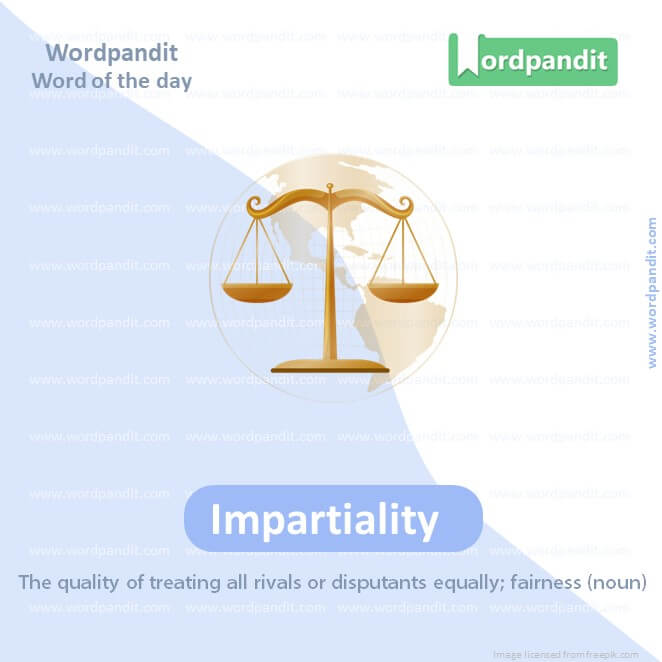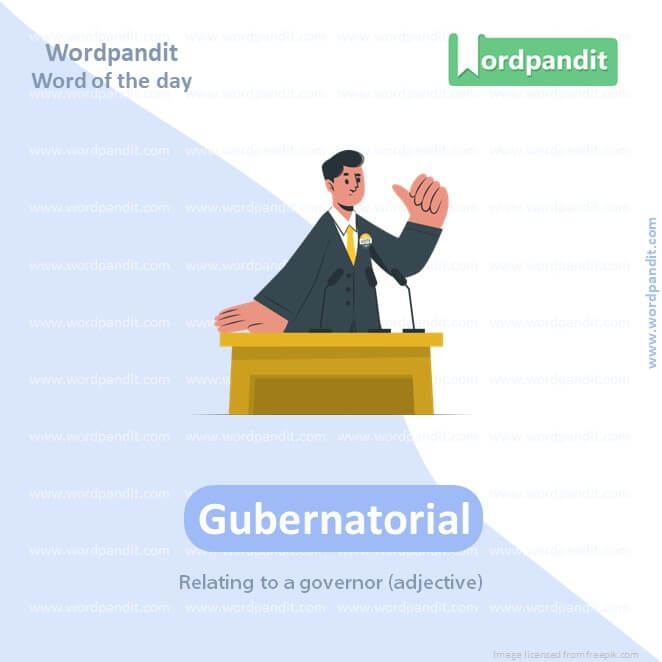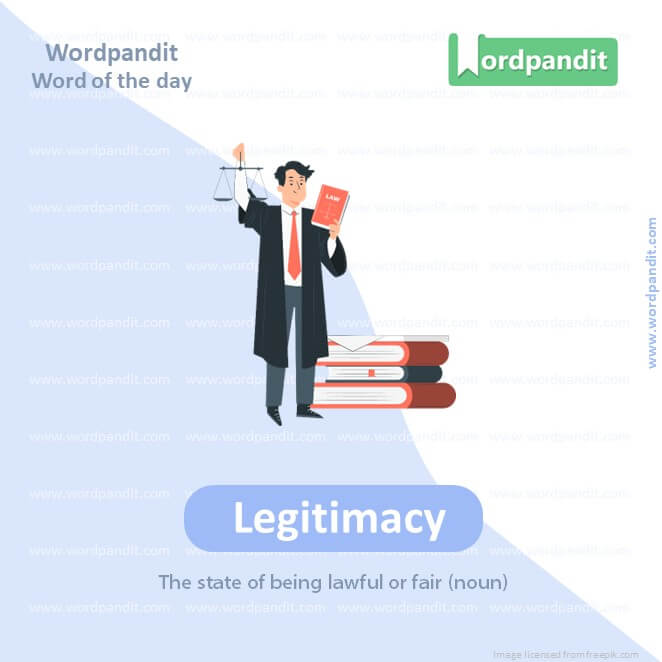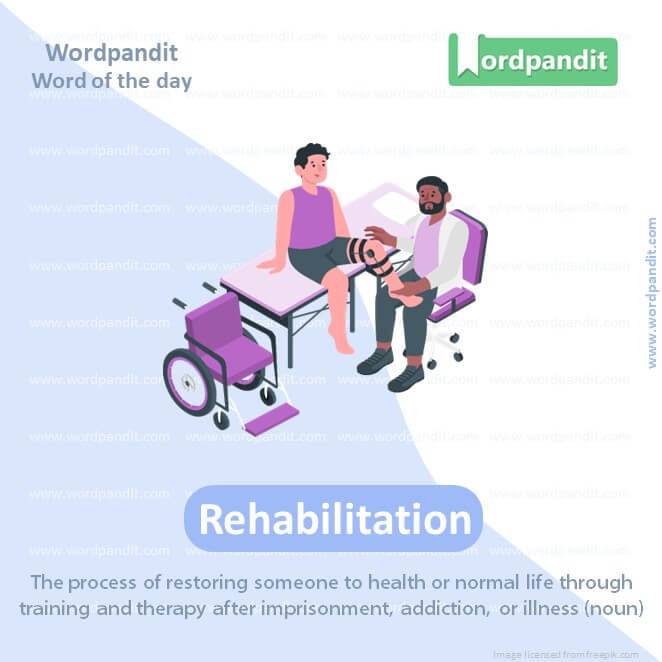Daily Vocabulary Words: List of Daily Used Words
Hi there. Welcome to this special section @ Wordpandit.
Our endeavour here is straightforward: highlighting important daily vocabulary words, you would encounter in The Hindu. This is your repository of commonly used words; essentially, we are posting a list of daily used words. Hence, this has significant practical application as it teaches you words that are commonly used in a leading publication such as The Hindu.
Visit the website daily to learn words from The Hindu.

WORD-1: Lamented
CONTEXT: The Sarkaria Commission Report (1988) lamented that “some Governors have failed to display the qualities of impartiality and sagacity expected of them”.
SOURCE: The Hindu
EXPLANATORY PARAGRAPH: Imagine you have a favorite toy that accidentally breaks, and you feel really sad about it. You might talk about how much you miss playing with it and how you wish it hadn’t broken. That expression of sadness or regret over something lost or gone is called “lamented.” It’s like talking about something you miss dearly and wish was still around.
MEANING: Felt or expressed sorrow or regret for (verb).
PRONUNCIATION: luh-MENT-ed
SYNONYMS: mourned, grieved, mournful, sorrowful, regretted, bemoaned, deplored
USAGE EXAMPLES:
1. The community lamented the loss of the old library, which was demolished to make way for a new building.
2. The fans lamented the retirement of their favorite athlete.
3. She lamented the passing of her beloved pet cat.
4. The poet’s lamented the decline of traditional values in modern society.
WORD-2: Sagacity
CONTEXT: The Sarkaria Commission Report (1988) lamented that “some Governors have failed to display the qualities of impartiality and sagacity expected of them”.
SOURCE: The Hindu
EXPLANATORY PARAGRAPH: Imagine you have a wise old owl friend who always gives you the best advice when you’re feeling unsure. That ability to understand and judge things wisely, like your owl friend, is called “sagacity.” It’s like having a special wisdom that helps you make good decisions and understand things clearly.
MEANING: Acuteness of mental discernment and soundness of judgment; wisdom (noun).
PRONUNCIATION: suh-GAS-uh-tee
SYNONYMS: wisdom, insight, discernment, prudence, intelligence, astuteness, shrewdness
USAGE EXAMPLES:
1. The sage was admired for his sagacity and deep understanding of human nature.
2. She sought the counsel of her grandmother, known for her sagacity and life experience.
3. The politician was praised for his sagacity in navigating complex political situations.
4. The CEO’s sagacity led the company through difficult times and onto a path of success.

WORD-3: Impartiality
CONTEXT: The Sarkaria Commission Report (1988) lamented that “some Governors have failed to display the qualities of impartiality and sagacity expected of them”.
SOURCE: The Hindu
EXPLANATORY PARAGRAPH: Imagine you’re playing referee in a game, and you have to make fair decisions even if one team is your favorite. Being fair and unbiased, like a good referee, is called “impartiality.” It’s like treating everyone equally and making decisions based on what’s right, not on personal feelings or preferences.
MEANING: The quality of treating all rivals or disputants equally; fairness (noun).
PRONUNCIATION: im-PAHR-shuh-LI-tee
SYNONYMS: fairness, neutrality, objectivity, justice, equity, even-handedness, detachment
USAGE EXAMPLES:
1. The judge’s impartiality ensured a fair trial for both the prosecution and the defense.
2. The newspaper prided itself on its impartiality in reporting news without bias.
3. The mediator’s impartiality helped resolve the dispute between the two parties.
4. In her role as a teacher, she always maintained impartiality when grading assignments.
WORD-4: Worsened
CONTEXT: Since then, the situation has only worsened. The Commission’s recommendation that the “(Governor) should be a detached figure and not too intimately connected with the local politics of the State” remains wishful thinking.
SOURCE: The Hindu
EXPLANATORY PARAGRAPH: Imagine you have a scrape on your knee that starts to bleed, and instead of getting better, it gets bigger and hurts more. That feeling of something getting even worse than it was before is called “worsened.” It’s like when things go from bad to even worse, making the situation more difficult or unpleasant.
MEANING: To become or make something more severe, serious, or unpleasant; to deteriorate or decline in quality (verb).
PRONUNCIATION: WUR-suhnd
SYNONYMS: deteriorate, decline, deteriorate, aggravate, exacerbate, degenerate, decline
USAGE EXAMPLES:
1. The patient’s condition worsened overnight, requiring immediate medical attention.
2. The economic situation worsened due to the effects of the pandemic.
3. Her headaches worsened with stress and lack of sleep.
4. The conflict between the two countries worsened as tensions escalated.
WORD-5: Intimately
CONTEXT: The Commission’s recommendation that the “(Governor) should be a detached figure and not too intimately connected with the local politics of the State” remains wishful thinking.
SOURCE: The Hindu
EXPLANATORY PARAGRAPH: Imagine you have a secret diary where you write down all your thoughts and feelings, and you keep it hidden under your bed. That private and personal connection you have with your diary, where you share your deepest thoughts, is called “intimately.” It’s like having a close and personal relationship with something or someone.
MEANING: In a very close or familiar way; closely, deeply, or personally (adverb).
PRONUNCIATION: IN-tuh-mit-lee
SYNONYMS: closely, deeply, personally, closely, profoundly, familiarly, closely
USAGE EXAMPLES:
1. The artist was intimately involved in every aspect of the creative process.
2. They knew each other intimately after years of friendship.
3. She spoke intimately about her childhood experiences during the interview.
4. The couple shared an intimately romantic moment under the stars.

WORD-6: Gubernatorial
CONTEXT: This happened after he sat on the Bills for a long time and after the government moved the Supreme Court praying for gubernatorial assent.
SOURCE: The Hindu
EXPLANATORY PARAGRAPH: Imagine there’s a big election in your town, and everyone is talking about who will become the new mayor. The person who wins the election will have a lot of power and responsibility, just like the governor of a state. Anything related to the governor, like the election or decisions made by the governor, is called “gubernatorial.” It’s like anything related to the mayor, but on a bigger scale.
MEANING: Relating to a governor (adjective).
PRONUNCIATION: goo-ber-nuh-TAWR-ee-uhl
SYNONYMS: governor’s, gubernatorial, governorship
USAGE EXAMPLES:
1. The gubernatorial candidate outlined her plans for improving education in the state.
2. The gubernatorial race attracted national attention due to its high stakes.
3. The governor’s gubernatorial powers include the ability to veto legislation.
4. The state legislature passed a bill limiting the gubernatorial authority over budget decisions.

WORD-7: Legitimacy
CONTEXT: It was in this context that he visited the University as Chancellor, as against the will of the Assembly. This action lacked democratic legitimacy.
SOURCE: The Hindu
EXPLANATORY PARAGRAPH: Imagine you’re playing a game with your friends, and you make up a new rule that everyone has to follow. But then someone says, “Hey, that’s not fair! You can’t just make up rules like that!” That feeling of something being fair, valid, or accepted is called “legitimacy.” It’s like something being officially recognized as being true or right.
MEANING: The state of being lawful or fair (noun).
PRONUNCIATION: lih-JIT-uh-muh-see
SYNONYMS: validity, legality, authenticity, credibility, legality, lawfulness, legitimacy
USAGE EXAMPLES:
1. The legitimacy of the election results was called into question by some political observers.
2. The legitimacy of the company’s claims was confirmed by independent audits.
3. The legitimacy of his claim to the throne was disputed by rival factions.
4. The court’s decision established the legitimacy of the new law.

WORD-8: Rehabilitation
CONTEXT: Also, there needs a legal prohibition against further rehabilitation of Governors in any official capacity. Raj Bhavans require systemic changes.
SOURCE: The Hindu
EXPLANATORY PARAGRAPH: Imagine you’re a superhero who got injured while saving the city, and now you’re in the hospital recovering. The process of getting better, stronger, and back to your superhero self is called “rehabilitation.” It’s like going through a special training program to recover from an injury or illness and get back to your normal life.
MEANING: The process of restoring someone to health or normal life through
training and therapy after imprisonment, addiction, or illness (noun).
PRONUNCIATION: ree-huh-buh-luh-TAY-shun
SYNONYMS: recovery, therapy, treatment, restoration, rehabilitation, reclamation, renewal
USAGE EXAMPLES:
1. The athlete underwent rehabilitation to recover from a serious knee injury.
2. The rehabilitation center offers programs to help individuals overcome addiction.
3. His successful rehabilitation allowed him to return to work after the accident.
4. The rehabilitation of the historic building preserved its architectural integrity.
WORD-9: Negligent
CONTEXT: Transporters, including bus and taxi unions, have called a nationwide strike from January 1 to January 30 to protest Section 106 of the BNS, which prescribes a maximum of punishment of 10 years in cases of rash and negligent driving.
SOURCE: The Hindu
EXPLANATORY PARAGRAPH: Imagine you have a glass of milk, and you accidentally knock it over without paying attention. That careless or careless behavior, where you didn’t take enough care to avoid causing harm or damage, is called “negligent.” It’s like not being careful enough, which can lead to accidents or mistakes.
MEANING: Failing to take proper care or giving the necessary attention or consideration; characterized by carelessness or neglect (adjective).
PRONUNCIATION: NEG-li-juhnt
SYNONYMS: careless, heedless, inattentive, neglectful, remiss, thoughtless, irresponsible
USAGE EXAMPLES:
1. The company was sued for negligent practices that led to environmental damage.
2. Her negligent driving resulted in a car accident.
3. The negligent handling of sensitive information led to a data breach.
4. The landlord was found negligent for failing to repair a dangerous staircase.
WORD-10: Lynched
CONTEXT: There are chances of being thrashed, and in some instances, drivers have been lynched. Drivers are an unorganised lot, they do not have a leadership.
SOURCE: The Hindu
EXPLANATORY PARAGRAPH: Imagine a group of people in a small town who wrongly believe that someone has committed a serious crime, and they decide to take matters into their own hands. Instead of waiting for a fair trial or seeking justice through legal means, they gather together and act violently, often resulting in the death of the accused person. This violent and illegal act, motivated by prejudice or anger, is called “lynching.” It’s like a mob taking justice into their own hands, without following the law or giving the accused a chance to defend themselves.
MEANING: To execute, especially by hanging, without legal authority or due process, often as a result of a mob action (verb).
PRONUNCIATION: LINCHT
SYNONYMS: execute, hang, mob, murder, kill, lynch
USAGE EXAMPLES:
1. The innocent man was lynched by a mob fueled by racial hatred.
2. Lynching was used as a means of terrorizing African American communities during the Jim Crow era.
3. The town’s dark history includes several instances of lynching.
4. The civil rights movement fought against racial injustice, including the practice of lynching.
Vocabulary Words in English
In the kaleidoscopic world of language, the thread of ‘vocabulary words in English’ weaves a rich tapestry. These words, the building blocks of communication, lend themselves to the eloquence and effectiveness of our speech and writing. Despite their significance, mastering ‘vocabulary words in English’ can sometimes be daunting, but with strategic approach, the process can be greatly simplified.
Learning ‘vocabulary words in English’ goes far beyond rote memorization. It requires an integrated approach that encompasses understanding and using the words. Consuming a diverse range of English materials such as novels, news articles, movies, music, and online content can acquaint you with words in actual use, helping you perceive both their meaning and usage in different contexts.
Furthermore, incorporating memory-enhancing techniques can add impactful strides to your journey of mastering ‘vocabulary words in English’. Methods such as the Leitner System or flashcards can bolster the memory retention of these words. Meanwhile, using mnemonic devices, associating words with unique stories or images, can help in retaining the ‘vocabulary words in English’ in long-term memory.
Another key to deciphering ‘vocabulary words in English’ is by practicing them in real-world contexts. Incorporate the new words into your daily conversations, written emails, or social media posts. Not only will this reinforce the meanings and applications, but also boost your confidence in using them.
In essence, understanding ‘vocabulary words in English’ is a continual journey that calls for persistent commitment, diverse learning approach, and ample practice. As you indulge in this exploration, you will find your command over the ‘vocabulary words in English’ becoming stronger, leading to more confident and dynamic communication. Remember – in the world of language, words are your faithful companions, and the more you engage with them, the more they’ll reveal their richness to you.











